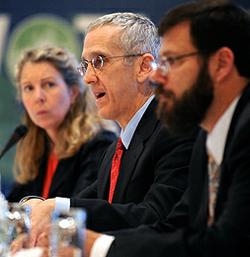New Day Dawns for U.S. Global Warming Policy
BONN, Germany, March 30 2009 (ENS) – President Barack Obama has reversed the U.S. position on global climate change negotiations from the skepticism, delays and obstructive strategies of the previous administration to a new cooperative policy based on both science and practicality.
"My team and I came here determined to make up for lost time. America is now once again strongly committed to developing a global response to climate change," the President's Special Envoy for Climate Change Todd Stern told journalists at the opening of the UN-backed Bonn climate talks on Sunday.
 |
At the U.S. press conference in Bonn, from left, State Department spokeswoman Susan Povenmire, Special Envoy for Climate Change Todd Stern, and Deputy Special Envoy for Climate Change Jonathan Pershing (Photo courtesy Earth Negotiations Bulletin) |
"We do not doubt the science, we do not doubt the urgency, and we do not doubt the enormity of the challenge before us," said Stern. "President Obama and his administration are fully committed to action, both at home – where that action is well underway already – and abroad."
"You will not hear anyone on my team cast doubt upon or downplay the threat of global climate change. The science is clear, and the threat is real. The facts on the ground are outstripping the worst case scenarios. The costs of inaction - or inadequate actions - are unacceptable," Stern today told more than 2,000 delegates from government, business and industry, environmental organizations and research institutions gathered at the Maritim Hotel in Bonn.
Negotiators are here for the first of a series of three sessions aimed at producing a draft document to succeed the Kyoto Protocol, whose first commitment period for reducing greenhouse gas emissions ends in 2012.
Stern told them that along with the challenge of climate change comes opportunity. "By transforming to a low-carbon economy, we can stimulate global economic growth and put ourselves on a path of sustainable development for the 21st century," he said. "I would go so far as to say that those who hang back and cling to a high-carbon path will be economic losers in the end because with the scientific facts of global warming getting worse and worse, high-carbon products and production methods will not be viable for long."
That draft is expected to be agreed at the annual United Nations climate conference in Copenhagen in December. Only eight months, constituting six weeks of real negotiating time, remain.
"This first negotiating session this year is critical for moving the world closer to a political solution to climate change," said Yvo de Boer, executive secretary of the UN Framework Convention on Climate Change, at the start of the nine-day meeting. "The clock is ticking down and countries still have much work to cover."
 |
UNFCCC Executive Secretary Yvo de Boer, far left, and Harald Dovland, far right, confer with delegates at Bonn. (Photo courtesy ENB) |
Discussions on greenhouse gas emissions reductions by industrialized countries after 2012 will center on issues relating to the scale of the reductions to be achieved by countries in total and individually.
Talks will focus on improvements to emissions trading and the Kyoto Protocol's carbon offset mechanisms, as well as concerns relating to land-use change and forestry.
"Industrialized countries are committed to lead the way, and the world is looking to them to agree on ambitious targets, in line with what science is telling us, in Copenhagen in December," said Harald Dovland, who chairs the working group leading the negotiations.
"We must lay the groundwork for this in Bonn at this session by shifting gears and moving into serious, in-depth negotiations," he said.
Stern, sworn in just six weeks ago, told the delegates that the Obama administration is ready to get serious about limiting climate change.
"The United States recognizes our unique responsibility both as the largest historic emitter of greenhouse gases and as a country with important human, financial, and technological capabilities and resources," he said. "America itself cannot provide the solution, but there is no solution without America."
"President Obama has taken that responsibility to heart, articulating a powerful and comprehensive commitment to transforming the United States economy to a low-carbon base," Stern said.
"We have many tools at our disposal to make this happen, and President Obama is intent upon using them," he said.
Stern outlined the Obama's administration's direction in its first 70 days in office, including $80 billion of new spending and loan guarantees in the economic stimulus package to accelerate the clean energy transformation of the United States.
President Obama is working with Congress to implement a nationwide cap and trade program that would cut emissions by more than 15 percent from current levels by 2020 and 80 percent by 2050, he said.
Environmental groups are calling for an emissions cut from the industrialized countries of at least 40 percent by 2020.
"Our Environmental Protection Agency is paving the way for more stringent standards for auto emissions and other regulatory measures," Stern said, adding that the President is "pursuing a 10 year, $150 billion investment program for clean energy research, development, and deployment to speed key technologies to market and make the mitigation effort easier for all countries in the coming decades.
This overall effort, especially the centerpiece cap and trade program, will largely set the level of the mid-term target and the longer-term pathway that the United States will take for reducing carbon emissions, said Stern.
 |
U.S. Special Envoy for Climate Change Todd Stern addresses delegates in Bonn. (Photo courtesy ENB) |
Stern called for "a global response, with truly significant actions by all major economies. The simple math of accumulating emissions shows that there is no other way to make the kinds of reductions that science indicates are necessary," he said.
He said developing countries need to have the opportunity to follow a cleaner path forward, "leap-frogging fossil fuels" altogether and going directly to clean sources of energy.
"I should say that I am enormously impressed by actions that many developing countries are already taking," said Stern, naming India, South Africa, Brazil, China, and Mexico.
Noting that China has taken similar strong steps as the United States to promote clean energy in its stimulus plan, Stern said, "The world needs to make this a green recovery."
Stern said the Obama administration will carry forward one forum for discussion established by the Bush administration - the Major Economies Forum on Energy and Climate. These sessions are aimed at facilitating a candid dialogue among key developed and developing countries to help generate the political leadership to achieve a successful outcome at the UN climate change negotiations in Copenhagen and pursue clean energy partnerships.
President Obama has invited the leaders of 16 major economies and the Secretary General of the United Nations to designate representatives for three preparatory sessions, the first to take place at the State Department on April 27-28 in Washington, DC.
The prep sessions will culminate in a Major Economies Forum Leaders' meeting, which Prime Minister Silvio Berlusconi will host in July in the aftermath of the G-8 meeting in Italy.
The 17 major economies are: Australia, Brazil, Canada, China, the European Union, France, Germany, India, Indonesia, Italy, Japan, Korea, Mexico, Russia, South Africa, the United Kingdom, and the United States. Denmark, in its capacity as the President of the December 2009 Conference of the Parties to the UN Framework Convention on Climate Change, and the United Nations have also been invited to participate in this dialogue.
Stern said the United States is seeking an agreement that can attract popular support, "so it will enter into force with all countries participating."
 |
Scouts present Yvo de Boer with the results of Earth Hour which took place March 28, 2009. (Photo courtesy ENB) |
"Let me speak frankly here," he said, "it is in no one's interest to repeat the experience of Kyoto by delivering an agreement that won't gain sufficient support at home in all of our countries, including my own."
On Sunday at the opening of the Bonn climate talks, the global conservation organization WWF and a group of German Scouts presented de Boer and the delegates with a ballot box from citizens across the world. The box symbolizes that hundreds of millions of people cast their votes for climate action by participating in Earth Hour, turning off their lights for an hour on Saturday night.
"Citizens worldwide have voted with their light switch – now it's high time for governments to show leadership and Vote Earth, by working towards a just, effective, and science-based climate treaty," said Kim Carstensen, leader of WWF's Global Climate Initiative. "Last night's message from the masses was loud and clear: Delay no more, real action now!"
"Signing a new global climate treaty in Copenhagen depends on having a comprehensive draft by June," said Carstensen. "In Bonn, delegates must show their cards and work towards consensus where it's still lacking."
"People expect the world leaders to come up with solutions. They need to embrace a low carbon economy to combat global warming," said Carstensen. "Any economic recovery package must serve to support livelihoods while at the same time sustaining the natural basis of the planet; it's the only logical way forward."
Copyright Environment News Service (ENS) 2009. All rights reserved.
To subscribe or visit go to: http://www.ens-newswire.com